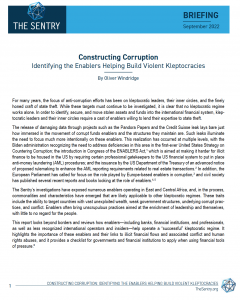 Read the full briefing
Read the full briefing
For many years, the focus of anti-corruption efforts has been on kleptocratic leaders, their inner circles, and the finely honed craft of state theft. While these targets must continue to be investigated, it is clear that no kleptocratic regime works alone. In order to identify, secure, and move stolen assets and funds into the international financial system, kleptocratic leaders and their inner circles require a cast of enablers willing to lend their expertise to state theft.
The release of damaging data through projects such as the Pandora Papers and the Credit Suisse leak lays bare just how immersed in the movement of corrupt funds enablers and the structures they maintain are. Such leaks illuminate the need to focus much more intentionally on these enablers. This realization has occurred at multiple levels, with the Biden administration recognizing the need to address deficiencies in this area in the first-ever United States Strategy on Countering Corruption; the introduction in Congress of the ENABLERS Act,* which is aimed at making it harder for illicit finance to be housed in the US by requiring certain professional gatekeepers to the US financial system to put in place anti-money laundering (AML) procedures; and the issuance by the US Department of the Treasury of an advanced notice of proposed rulemaking to enhance the AML reporting requirements related to real estate transactions.* In addition, the European Parliament has called for focus on the role played by Europe-based enablers in corruption,* and civil society has published several recent reports and books looking at the role of enablers.* *
The Sentry’s investigations have exposed numerous enablers operating in East and Central Africa, and, in the process, commonalities and characteristics have emerged that are likely applicable to other kleptocratic regimes. These traits include the ability to target countries with vast unexploited wealth, weak government structures, underlying corrupt practices, and conflict. Enablers often bring unscrupulous practices aimed at the enrichment of leadership and themselves, with little to no regard for the people.
This report looks beyond borders and reviews how enablers—including banks, financial institutions, and professionals, as well as less recognized international operators and insiders—help operate a “successful” kleptocratic regime. It highlights the importance of these enablers and their links to illicit financial flows and associated conflict and human rights abuses, and it provides a checklist for governments and financial institutions to apply when using financial tools of pressure.*
Recommendations
Private sector
- Banks and other financial institutions should use the categories of enablers discussed to identify red flags and share typologies for the onboarding of new clients and the review of existing clients and their accounts, with a view toward enhancing due diligence checks.
- Banks and other financial institutions should increase their engagement with government, regional, and other public institutions to best identify the categories of enablers mentioned in this report with a view toward sharing intelligence, thereby ensuring that enablers are not able to move looted funds and profits.
- Banks and other financial institutions should adopt policies and processes that allow for clear lines of communication with civil society and journalists in order to act upon information relating to enablers.
- Professionals working in the legal, accountancy, and real estate sectors should similarly use the categories discussed to identify red flags both in client onboarding and in ongoing relationships. They should report suspicious activities to local financial intelligence units.
Public sector
- Government and regional bodies should prioritize and, when possible, fast-track the passage and adoption of legislation and regulatory action that targets the role of enablers.
- Government and regional bodies should use the categories of enablers mentioned in this report as a framework to identify countries that may be particularly susceptible to enablers, with a view toward the implementation of further pressure. For example, when one or more of the categories of enablers is known to operate in a country, this should trigger the deployment of financial tools of pressure.
- Governments and regional bodies should issue alerts or advisories focused on enablers that include real-world examples of the dangers of working and engaging with enablers in high-risk jurisdictions.
- The US, UK, EU, Canada, Australia, and other jurisdictions should prioritize applying targeted network sanctions via Global Magnitsky-style or other appropriate sanctions regimes against enablers, including those cited in the case studies above, who continue to assist kleptocratic leaders. Sanctions against enablers tend to be particularly effective given their access to the global financial system.
- The US, UK, EU, and other jurisdictions should increase the issuance of advisories and alerts focused on violent kleptocratic regimes and the enablers that benefit from them. Consideration should be given to enabler-specific advisories and alerts.
- Law enforcement agencies in the US, UK, EU, and other jurisdictions should prioritize the rising influence of enablers and their links to increased illicit financial flows and kleptocracy. Focused initiatives should be launched to investigate enablers’ modes of operations, and suitable law enforcement tools should be engaged to disrupt, investigate, and prosecute, when possible.
- Regulated professions—for example, lawyers and accountants—should, through appropriate bar and accountancy associations, launch kleptocracy-focused initiatives to work with and train members on the dangers posed by kleptocracies, the commonalities across countries, and the links between corruption, conflict, and human rights violations.
- Countries susceptible to the presence and influence of enablers should conduct transparent and open reviews of consultants, businesspersons, and advisors working at high positions within government to best determine and remove unwanted influences.
Read the full briefing and recommendations >

